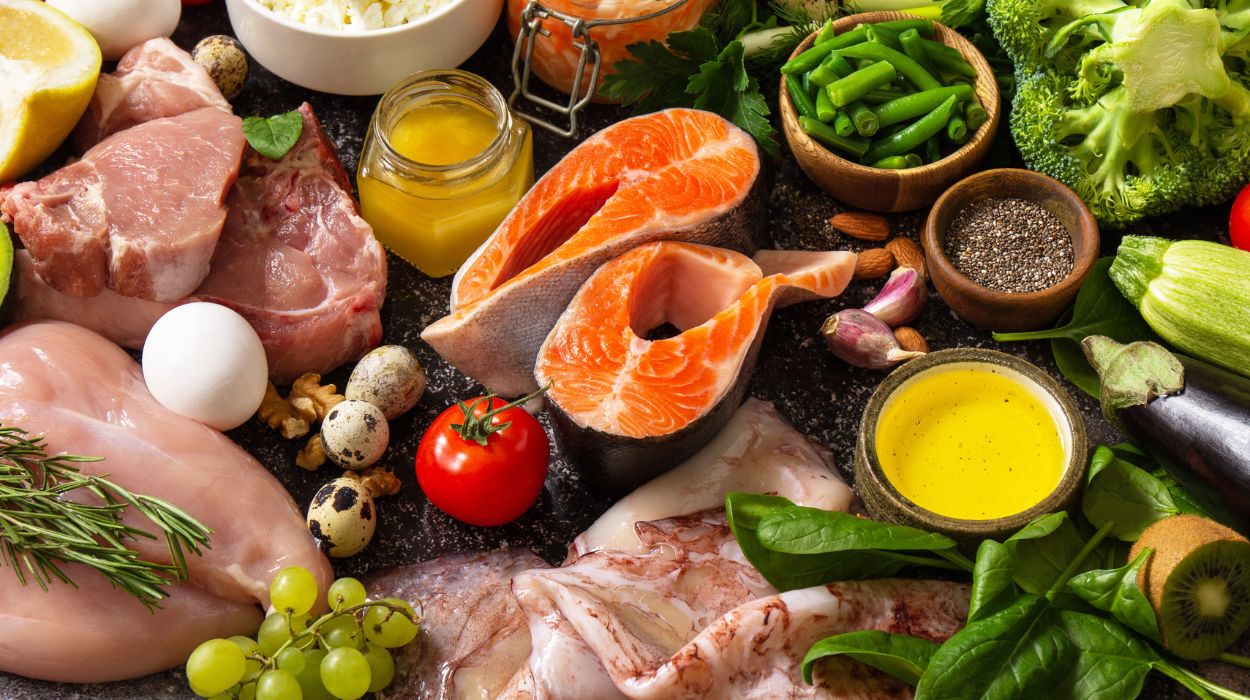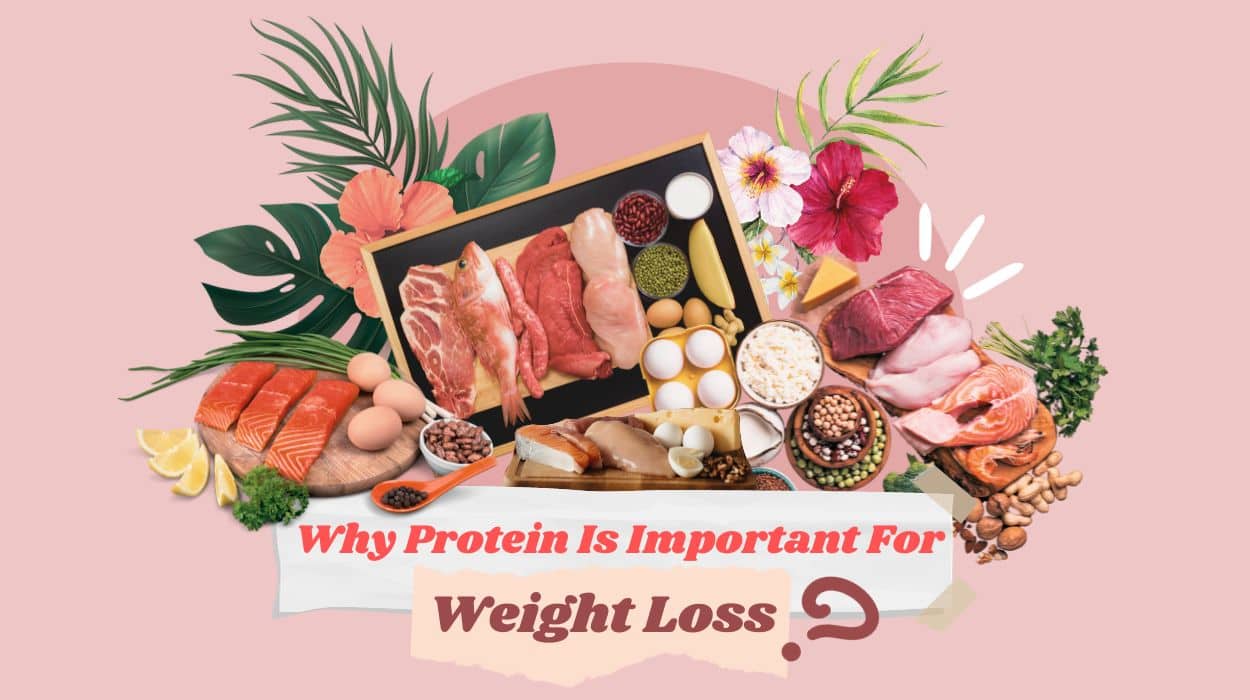We always hear about how important protein is for weight loss. The question is why does protein have such a significant spotlight? Without giving away too much, its filling boosts the metabolism in two ways and increases activity levels.
During my journey, reducing overall calories and observing high protein intake was how I stripped off 70 pounds of fat in under 6 months.
Why Is Protein Important For Weight Loss?
Protein is a crucial macronutrient that plays a vital role in the human body weight. Protein plays the following roles in weight loss:
- Keeping You Satiated Between Meals
- Highest Thermic Effect Amongst All Macronutrients
- Enhances Muscle Growth And Metabolism
- Stabilizes Your Blood Sugar
Why Is Protein Important In Losing Weight?
Keeps You Satiated Between Meals

The satiety effect[1] of protein is an amazing, yet overlooked property. Amino acids within protein interact with several hormones that reduce hunger, which ranks it as the most satiating macronutrient. For this reason, high-protein diets decrease the chances of snacking and grazing in between meals. Essentially, it controls total daily calorie intake. As most of us know, food/caloric intake has the largest impact when it comes to losing weight.
In one pound of fat, there are around 3500 calories.[2] For an individual to lose 1 lb of fat mass per week, a 500-calorie deficit per day is required. A caloric deficit is achieved by taking in fewer calories than your body needs to maintain its current weight.
For example, let’s say that a sedentary individual has a caloric maintenance of 2400 calories (calories needed to maintain current weight). To reach a 500-calorie deficit, this individual would need to hit an intake of 1900 calories (calories needed to lose weight). Planning 3 squat meals of ~633 calories should promote weight loss.
However, let’s say that the protein intake of each meal was low, where the example subject did not feel satisfied and began to engage in unplanned snacking. The subject consumed a Snickers bar (280 calories), a bag of Cheetos (160 calories), and a can of soda (139 calories) between meals. This adds 579 calories to the desired target, thus destroying weight loss efforts.
Highest Thermic Effect Amongst All Macronutrients
There are 3 macronutrients that are referred to as protein (4 calories/gram), carbohydrates (4 calories per gram), and dietary fats (9 calories per gram). Each of these macronutrients has a thermic effect,[3] which means the body burns a certain amount to process them. You could think of it as the percentage of the macronutrients’ own calories.
Due to the unique structure of the amino acids within protein, the body has to work harder to digest, metabolize, and absorb it after consumption. This process yields a thermic effect of ~30%. Other macronutrients have a much lower thermic effect, where carbohydrates yield ~8% and dietary fat at the lowest 3-4%.
Let’s say that you have 200g of protein and 200g of carbohydrates. Both protein and carbohydrates contain ~4 calories per gram, so it would only make sense that the caloric composition would be identical amongst both macronutrients in our 100g example (800 calories each). However, the thermic effect of protein is significantly higher. To process the 800 calories of protein, 240 calories would be burnt, whereas carbohydrates on 64 calories would be burned for carbohydrates.
Based on the thermic effect of food, higher protein intake in relation to carbohydrates and dietary fats could create lower net caloric intake. This is not to say that you should neglect carbohydrates and body fat as they both play vital roles in overall health and well-being when they are consumed in the “right” ratios.
Enhances Muscle Mass Growth And Metabolism
Protein-rich foods are ingested and broken down in the gut, where the essential amino acids are extracted and transported to the bloodstream. Upon reaching the blood, an enzyme called mTOR sends a signal, which goes through a variety of processes and then reaches the mitochondria within the muscle. Through a process of transcription via the DNA and translation via the mRNA, muscle proteins are synthesized.[4] In simple words, a high-protein diet can work wonders when it comes to the growth of muscle mass.
With the additional lean body mass, you should become more mobile and stronger. This can influence the amount of movement produced on a daily basis, and the effort that you apply to exercise. Subsequently, these variables can boost total daily caloric expenditure. Over time, these calories can accumulate which may drive a caloric deficit and help towards lose weight/management.
The second benefit is that muscle is the most thermo-active tissue within the body and burns ~6 calories per pound on your frame. With a healthy amount of lean muscle mass, your metabolism would work a lot faster even at rest. In turn, this could help keep body fat controlled over the longer term.
Stabilizes Your Blood Sugar
Eating protein as part of our meal can blunt the response of insulin due to slowing down the digestion and absorption process. This effect can stabilize blood sugar and prevent lethargy, so you can remain active and burn more daily calories. If carbohydrates were consumed solely, you would expect more of a spike, higher blood sugar, and a feeling of lethargy for those who are overweight and insulin-resistant.
Are Protein Supplements Good To Lose Weight?
It really depends on the type of protein supplement. Some supplements that are marketed as “high protein” have been amalgamated with carbohydrates and fats, which increases their overall calories. These can be mass gainers, protein bars, protein cookies, etc.
The protein supplement I regard as “good for weight loss” is a whey isolate or concentrate power mix. These protein powders are high in protein, yet low in overall calories. A single scoop of high-quality whey could provide 20-25g of protein and just over 100 calories. These protein powder mixes should contain no more than 3-4g of carbohydrates and 1-2g of healthy fat.
Good protein supplements will boost total protein intake and may amplify all of the benefits that we have highlighted above.
How Much Protein Do You Need To Eat To Lose Weight?
The recommended daily protein intake globally is approximately 80-100g per day, although this may vary depending on the country. This would be enough protein to maintain healthy bodily functions. However, Athletes, exercise enthusiasts, and those interested in weight loss may benefit from consuming more protein.
Protein requirements[5] vary from person to person, but a good rule of thumb is to consume 1-1.2 grams of protein per pound of lean body weight. This typically puts individuals within the range of 150-160g. Further in this article, we will discuss the importance of protein in greater detail.
What Is The High Protein Diet Source?

To determine the quality of a protein source for muscle protein synthesis, we need to look at the concentration of essential amino acids, specifically leucine. Leucine is the branched amino acid responsible for triggering muscle protein synthesis. To maximize muscle protein synthesis a dose of ~2-3g has shown to be effective, which can be obtained from 25-30g of whey protein.
You may require a lower amount of protein from a source with a higher concentration of Leucine and still get the same muscle recovery response. For example, 25g of whey protein could provide the same amount of leucine (~2-3g) as larger 45g of wheat protein and yield the same muscle synthetic response.[6]
To judge the overall quality of a protein source, we need to also take into account the micronutrient density, as well as fat and fiber content.
In regards to muscle protein synthesis, there are 8 high protein foods in order of quality:
- Whey Protein
- Milk Protein
- Egg Protein
- Casein Protein
- Fish Protein
- Beef Protein
- Chicken Protein
- Wheat or Soy Protein
Ways To Add Protein To Your Diet
Based on decades of practical application, we have provided 5 ways to add protein to your diet. These include:
Add Protein Powder To Shakes And Smoothies
A good smoothie is packed with micronutrients and fiber but often lacks protein. Do you know what would make them better? Just simply add a scoop or two of a flavored whey protein powder. Not only will this enhance the flavor, but add 20-40g of additional protein into your diet.
Replace Snacks With Whey Protein Shakes
You could replace “unhealthy” snacks like candy bars, chips, and soda with lean protein. Personally, I incorporate planned protein shakes, blending 1.5-2 scoops of whey protein with 6-8 fl oz of water. A couple of these shakes per day can bring in an additional 80g of protein into the diet.
Eat More Protein At Breakfast
Sleeping hours are when you enter a fasted state, which can build an appetite. In my opinion, breakfast time is the best time to get in a 40-50g protein meal. You could include some eggs, sausage, bacon, beans, etc. I typically consume a meal and a scoop of whey protein blended with semi-skimmed milk or water.
Consume High-Protein Meals
Consuming meals that contain a healthy protein source can help boost protein intake. I typically go for a chicken breast, fish filet, lean beef steak, etc. I typically include 3 square meals per day, with at least 100-200g chicken breast (or another source) in each and some rice. This type of meal could yield 30-50g of protein.
Do NOT Skip Meals
It is not difficult to work this one out, but often takes reminding. By skipping meals, you are essentially missing a lot of protein intake. For example, 3 meals with 30g of protein each gives you a better chance to meet a protein-rich diet, compared to a single meal of 30g protein right?
Conclusion
Without a doubt, protein is the most macronutrient when it comes to weight loss. It keeps you fuller, burns lots of calories to process, boosts muscle/metabolism, and stabilizes blood sugar. A high protein diet at roughly 1-1.2g/lb of lean mass is recommended for weight loss.
The best protein sources are essential amino acids like whey, milk, and egg protein. Supplementation may boost total protein intake to reap the benefits.
For those wanting to add more protein to their diet, you could; add protein to your smoothies, replace unhealthy snacks with whey shakes, consume high-protein meals, and do not skip any meals.
Frequently Asked Questions
YES! In the short term through its high thermic effect and in the long term by building muscle, which is the most thermic active tissue.
They boost protein intake to reap all of the benefits.
Whey protein! It activates muscle protein synthesis effectively and is low in calories.
 Expert's opinion
Expert's opinion
